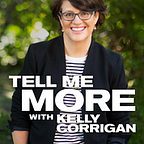I’ll Always Take the Long Answer
My husband Edward recently told me, in the kindest possible way, that he thinks sometimes I “go on” a bit. For instance, when people ask me how my book is coming, he thinks they’re looking for something simple, like “good.” When I say, “Well, I handed in a rewrite last week and the editors were happy with it so maybe I’m a month away from being finished,” he suspects that may be 23 more words than they wanted.
When I pressed him (“But they asked!”), he said it was probably different for everyone but that if he were me, he’d err on the side of too little information (TLI) not too much (TMI). But, I argued, if we all err on the side of TLI — if everyone’s answer to everything is “good” — it’s gonna be a pretty dull garden party.
On the flip side, the possibility that I am verbally overstaying my welcome makes me cringe.
For the record, unless I’m running to the bathroom or standing in the rain, there isn’t anything I’d rather do that hear about the new client you just signed or how your mother-in-law offended you by organizing your daughter’s closet or the NPR story about the transgender dad in St Louis that kept you up last night. I’m hoping you’ll give me at least a paragraph or two, not a word.
Beyond the facts of your life, I’d also like to know what you believe in — who you voted for, if you go to church, oh, and I’d like to know the last time you yelled so loud it hurt your throat. I’m not judging, by the way. I’m calibrating. I know enough to draw the line at money and sex. (However, thanks to a few confidantes and Anna Sale’s most excellent podcast, I have a couple key data points on both topics that have served me well over the years.)
I’ve always felt self-conscious about my curiosity, perhaps because my mother and her generation esteem their privacy so. (When my mom saw the movie “The Queen,” in which a member of the family died tragically and no voice was given to grief, she called on the way home from the theater to say, “That’s precisely how I feel about things. Some things aren’t meant to be discussed.”)
Also, I have been teased. (Yes, reader, teased!) And we all know that teasing is just a clever, sometimes graceful way to reset the conversation. So when people say, “Kelly, TMI!” I know to pull back and start talking about something banal, eg low carb diets or how social media is ruining everything.
But about once a month I get the housewives’ equivalent of a Kindergarten “All About ME” session — a set of questions in an email that I am supposed to answer and then “Forward to 10 great women!!!!” The questions range from casual, “What’s your favorite cereal?” to the traumatizing, “How do you know that you are turning into your mother?” What is clear from all of them is that needs are going unmet. Those emails are begging for more sharing.
And what are we to make of games like Scruples or Table Topics, with questions printed on each side? My friend Beth keeps the deck on her kitchen table. Back when we used to eat together as families, over turkey burgers and beans, I pulled: “What is your greatest regret?” Each person answered and I left that night feeling connected in new ways to friends I’ve had for years now. (My regret was a broad-shouldered Lambda Chi in ’87, if you must know.)
By definition, sharing is the joint use of a resource and the resource I want more of is Life Experience. My limits are clearer to me than ever. Your trip to Africa, your front row seats to James Taylor, your meeting with the head of the NBA may be the closest I ever come to any of those things. So please, go on a bit.
Kelly Corrigan writes books, has a show on PBS and a weekly podcast where TMI is what it’s all about.
